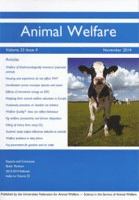
ANIMAL WELFARE
Scope & Guideline
Transforming insights into impactful animal welfare practices.
Introduction
Aims and Scopes
- Animal Welfare Assessment:
The journal focuses on developing and validating assessment tools and methodologies for evaluating the welfare of various species, including livestock, companion animals, and wildlife. This includes qualitative assessments as well as quantitative measures. - Ethical Considerations in Animal Research:
A significant emphasis is placed on the ethical implications of animal research, including the 3Rs principles (Replacement, Reduction, Refinement) and discussions surrounding animal rights and responsibilities. - Human-Animal Interactions:
Research exploring the dynamics of human-animal relationships, including the impacts of these interactions on animal welfare and the emotional and psychological aspects of animal care. - Innovative Animal Management Practices:
The journal highlights innovative practices in animal husbandry, veterinary care, and wildlife management that aim to enhance animal welfare outcomes. - Public Perceptions and Socioeconomic Factors:
It addresses the influence of public attitudes, cultural beliefs, and socioeconomic factors on animal welfare, exploring how these elements shape policies and practices. - Environmental and Social Enrichment:
Research on the importance of environmental enrichment and social structures in promoting the welfare of animals, particularly in captive settings.
Trending and Emerging
- One Welfare Approach:
This emerging theme integrates animal welfare with human welfare and environmental sustainability, recognizing the interconnectedness of these domains. It emphasizes holistic solutions that address the welfare of all beings involved. - Technology and Animal Welfare:
The integration of technology in animal welfare practices is gaining traction, with studies exploring the use of sensors, data analytics, and innovative management systems to enhance animal care and monitoring. - Impact of COVID-19 on Animal Welfare:
Research examining the repercussions of the COVID-19 pandemic on animal welfare, including changes in pet ownership dynamics, sheltering practices, and the welfare of farmed animals during the crisis. - Behavioral and Psychological Welfare Studies:
There is an increasing focus on understanding the behavioral and emotional states of animals, with research aimed at assessing stress, anxiety, and overall mental well-being. - Cross-Species Welfare Comparisons:
Emerging studies are comparing welfare indicators across different species and contexts, fostering a broader understanding of welfare needs and strategies that can be applied universally.
Declining or Waning
- Traditional Animal Husbandry Practices:
Research centered on conventional animal husbandry methods has decreased as the journal shifts towards more innovative and welfare-centric approaches, reflecting a broader movement toward sustainable and humane animal management. - Generalized Animal Rights Discussions:
While discussions about animal rights remain relevant, the journal has seen less emphasis on broad philosophical debates, focusing instead on practical applications and assessments of welfare in specific contexts. - Single Species Studies:
There has been a noticeable decline in studies focusing exclusively on single species without comparative analysis, as the journal increasingly promotes interdisciplinary and holistic approaches to animal welfare.
Similar Journals

AUSTRAL JOURNAL OF VETERINARY SCIENCES
Innovative Insights into Animal Health and CareAUSTRAL JOURNAL OF VETERINARY SCIENCES is a prominent platform for innovative research in the field of veterinary science, published by UNIV AUSTRAL CHILE, FAC CIENCIAS VETERINARIAS. This journal, bearing the ISSN 0719-8000 and E-ISSN 0719-8132, serves as a vital resource for researchers, veterinarians, and students interested in advancing their knowledge in veterinary practices and animal health. With its influence reflected in its Q3 category ranking in the Veterinary (miscellaneous) field, and its Scopus rank of #95 out of 194, the journal highlights a robust commitment to disseminating valuable findings and insights. Between the years 2017 to 2024, it aims to provide open access to significant advancements and discussions in veterinary science, ensuring that vital research is accessible to a global audience. Located in Valdivia, Chile, the journal emphasizes its role in enhancing veterinary scholarship and fostering professional development within the community.
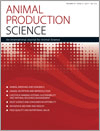
Animal Production Science
Innovating Insights for Food Security and Animal WelfareAnimal Production Science, published by CSIRO PUBLISHING, is a prestigious journal that caters to the fields of Animal Science and Food Science. With an ISSN of 1836-0939 and an E-ISSN of 1836-5787, the journal features high-quality research and reviews that are crucial for advancing the understanding and innovation of animal production systems. Recognized within the Q2 category of both Animal Science and Zoology, and Food Science, as per the 2023 Journal Rankings, Animal Production Science has achieved commendable Scopus rankings, placing it in the 68th and 48th percentiles in its respective categories. With converged years from 2009 to 2024, and an aim to disseminate knowledge that promotes sustainable practices, the journal is pivotal for researchers, professionals, and students devoted to animal production and food security. Exploring topics from livestock management to food quality, the journal offers valuable insights for enhancing productivity while considering welfare and environmental impact. For those seeking accessibility, the journal provides various open access options, encouraging a wider reach of its scholarly articles.
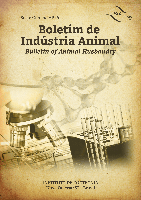
BOLETIM DE INDUSTRIA ANIMAL
Advancing Knowledge in Animal Industry PracticesBOLETIM DE INDUSTRIA ANIMAL is a prominent academic journal dedicated to the field of animal industry, published by the Instituto de Zootecnia. As an Open Access journal since 1974, it provides a vital platform for researchers, professionals, and students to disseminate knowledge and advancements in animal production, husbandry, and veterinary sciences. With its commitment to enhancing the visibility and accessibility of research, BOLETIM DE INDUSTRIA ANIMAL encourages rigorous scientific inquiry and innovation within its community. The journal presents a rich repository of articles encompassing a wide range of topics related to animal science and industry practices. Published in Brazil and accessible globally, it aims to foster collaboration and knowledge exchange among scholars, ultimately contributing to the advancement of sustainable practices in the agricultural and animal husbandry sectors.

Scientific Papers-Series D-Animal Science
Innovating Research for Healthier AnimalsScientific Papers-Series D-Animal Science is a prominent academic journal published by the University of Agronomic Sciences and Veterinary Medicine Bucharest (USAMV). With its ISSN number 2285-5750 and E-ISSN 2393-2260, this journal serves as a critical platform for the dissemination of innovative research in the field of animal science and veterinary medicine. The journal focuses on a broad range of topics, from animal breeding and nutrition to health and welfare, contributing significantly to the advancement of knowledge and practice within these vital areas. Although it currently does not offer open access, the journal maintains a commitment to high-quality research with the potential to influence policy and practice in animal sciences. Researchers, professionals, and students are encouraged to engage with the journal to enhance their understanding and contribute to ongoing discussions in this essential field. The journal's rich academic environment fosters collaboration and encourages submissions of original studies, reviews, and case reports that can shape the future of animal science.
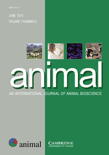
Animal
Bridging research and practice in veterinary medicine and wildlife management.Animal is a leading academic journal published by Elsevier that stands at the forefront of research in the field of Animal Science and Zoology. Founded in 2007, it has rapidly garnered a prestigious reputation, achieving a remarkable Q1 ranking in its category for the year 2023, placing it in the top 4% of journals in the discipline. With an impressive impact, as indicated by its rank of 19 out of 490 in Agricultural and Biological Sciences on Scopus, this journal serves as a vital platform for researchers, professionals, and students to disseminate groundbreaking findings and interdisciplinary studies. Animal not only offers paid subscription access but also provides an option for Open Access, thereby enhancing the visibility and reach of significant research contributions. With its comprehensive scope and commitment to advancing the understanding of animal biology, behavior, and welfare, Animal plays a crucial role in shaping the future of animal science. For anyone invested in the environment, veterinary medicine, or wildlife management, this journal is an essential resource that fosters knowledge exchange and continued developments in the field.

ISRAEL JOURNAL OF VETERINARY MEDICINE
Advancing Veterinary Knowledge for a Healthier TomorrowThe Israel Journal of Veterinary Medicine, published by the Israel Veterinary Medical Association, serves as a vital resource for researchers, professionals, and students in the fields of veterinary medicine and animal science. With a commitment to advancing knowledge across diverse veterinary disciplines, this journal plays a crucial role in disseminating significant findings and innovations that influence both local and global veterinary practices. Although it currently holds a Q4 ranking in both the Animal Science and Zoology and Veterinary (miscellaneous) categories, the journal's open access policy, enabling free availability of articles, aspires to increase its accessibility and engagement among the academic community. The journal's convergence of research from 2007 to 2024 showcases its dedication to continuously contributing to the evolving landscape of veterinary science.
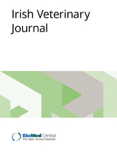
IRISH VETERINARY JOURNAL
Leading the way in veterinary discoveries and insights.IRISH VETERINARY JOURNAL is a premier open-access publication in the field of veterinary science, established to disseminate high-quality research and innovations that advance the veterinary profession and animal health. Published by BMC since 2004, this journal not only ensures worldwide access to cutting-edge findings but also maintains an impressive ranking as Q1 in the Veterinary (miscellaneous) category according to the 2023 metrics, highlighting its significance and influence. With an impressive Scopus rank of #19/194 and a 90th percentile placement, it provides a robust platform for researchers, professionals, and students alike to engage with the latest studies, reviews, and case reports. The journal's coverage spans from its inception in 1973 to the present, catering to a diverse audience interested in various aspects of veterinary science, ensuring that it remains an essential resource for those passionate about the welfare of animals and the advancement of veterinary practices.
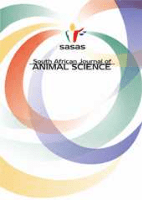
SOUTH AFRICAN JOURNAL OF ANIMAL SCIENCE
Fostering excellence in animal research since 1974.SOUTH AFRICAN JOURNAL OF ANIMAL SCIENCE is a leading scholarly publication dedicated to the dissemination of original research, review articles, and critical insights in the fields of animal science and zoology. Established in 1974, this journal is published by the South African Journal of Animal Sciences and has since become an essential resource for researchers and professionals in the field. The journal, which currently holds a Q3 ranking in Animal Science and Zoology as per Scopus rankings, aims to promote scientific knowledge and innovation in animal husbandry, welfare, nutrition, and breeding practices, with a particular emphasis on the South African context. The journal's rigorous peer-review process ensures high-quality research is shared widely among the academic community. Researchers and students alike will find valuable content and access options that support ongoing education and professional development in this vital area of study. For more information, interested readers can contact the editorial office at PO Box 13884, Hatfield 0028, South Africa.

Large Animal Review
Elevating standards in large animal veterinary practice.Large Animal Review is a prestigious academic journal dedicated to advancing the field of veterinary science, particularly focusing on the health and management of large animals. Published by the SIVAR-SOC ITALIANA VETERINARI ANIMALI REDDITO, this journal is an invaluable resource for researchers, practitioners, and students eager to explore innovative methodologies, research findings, and case studies related to veterinary medicine for larger species. With a commitment to quality, Large Animal Review holds a Q3 categorization in the Veterinary (miscellaneous) sector according to the 2023 metrics, indicative of its growing influence within the academic community. The journal benefits from an international readership and is dedicated to fostering interdisciplinary collaborations, making it an essential addition to any professional's library. The journal is accessible through various platforms, ensuring wide distribution of its valuable content, as it strives to enhance the understanding and welfare of large animals across diverse settings.
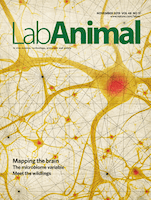
LAB ANIMAL
Advancing humane practices in laboratory animal science.LAB ANIMAL, a journal published by NATURE PORTFOLIO, is a prominent source of knowledge in the fields of animal science and veterinary medicine. With its ISSN 0093-7355 and E-ISSN 1548-4475, it serves as a critical platform for researchers, professionals, and students dedicated to the advancement of laboratory animal science. Despite being categorized in the Q4 quartile for Animal Science and Zoology and Q3 for Veterinary (Miscellaneous) in 2023, its contributions are invaluable, reflecting rigorous research and development essential for improving laboratory animal care and ethical research practices. The journal aims to foster innovation and responsive dialogue in an evolving landscape of animal research, promoting a more humane and scientifically sound approach. Although it currently operates under a subscription-based model, LAB ANIMAL continues to be an essential resource for the academic community, providing insights that are integral to advancing both veterinary and animal sciences. The journal has consistently published research since its inception in 1995, engaging a diverse audience with comprehensive studies and discussions that impact the future of the field.